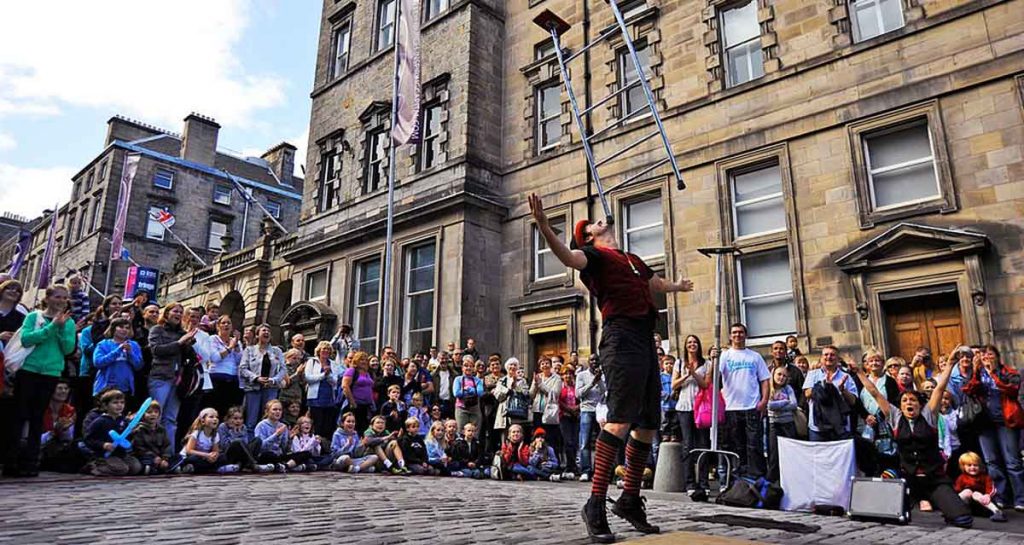The Edinburgh Fringe Festival, which sees nearly two million visitors over three weeks, has marked 70 years of its running. The Edinburgh Fringe Festival, a statement of rebellion in art, music and theatre that showcased 50,266 performances during 3,269 shows at 294 venues this year, is said to be the largest art festival in the world.
A total of 62 countries participated in the festival, which was organised during August 4-28 this year. As a part of the UK-India Year of Culture, India’s Ministry of Culture, the Indian Council for Cultural Relations, the Indian High Commission and festival producer Teamwork Arts (of JLF and Meta Theatre fame) brought a selection of the country’s theatre, dance and music to the event featuring 26 Indian performances.
Indian Performances
One of the many notable shows came from the Indian Navy band, which comprised 65 musician-sailors who performed under the baton of Commander Vijay Charles D’Cruz. They also teamed up with a troupe of dancers to portray India’s western seaboard.
Their performance was a part of The Royal Edinburgh Military Tattoo, a series of military tattoos performed by British Armed Forces, Commonwealth and international military bands and musical teams on the esplanade of the Edinburgh Castle. Prince Charles and Prince William attended the shows.
Actor-director Yuki Ellias wove an intriguing tale of adventure for children in a homage to Lord Ganesha, in a show called Elephant in the Room. The protagonist is a young boy named Master Tusk, who has been given a new head — an elephant’s! Amid a cursed love affair, an encounter with an eccentric old elephant and a hunt for a missing head, Master Tusk sets off on an adventure that changes his life.
Dancer Shilpika Bordoloi, who put up an evocative narrative in a performance titled Majuli, said to IANS: “This production is an earnest effort to share the story of Majuli through a personal vocabulary of movement, dance and theatre. The island has fascinated me from my early childhood days through frequent boat rides that I shared with my father.”
Majuli is an island on the Brahmaputra river in Assam.
Aditya Roy’s The Offering (also called Guru Dakshina) narrated the story of a boy who dreams of the great warriors of the past and of being one of them.
Cross-cultural Creations
In collaboration with the Edinburgh University, the students of Delhi University came up with a theatrical performance titled Blind Spots. It depicted the life of people structured around campus, where everybody is trying to tell a story, a tale that deals with personal aspirations, social mobility and integration. The show depicted young India’s voices and spaces from personal, literary and historical sources.
“The collaboration underlines the University of Edinburgh’s commitment to develop partnerships with Indian institutions and deepen and extend Edinburgh’s relationship with India,” Professor James Smith, vice principal (International) of Edinburgh University, said.
The symbolic ritual of Indian dance was represented in an Alba Flamenca group’s performance. Also part of the event were several stand-up comedy shows by Indian origin artistes like Hari Srikanth, the 2014 BBC award winner; Rahul Kohli; Dharmender Singh with his Bollywood stories; and San Francisco-based Sid Singh, who gave this memorable line: “Kanye West deleted all of his tweets about Trump so if you still want to hear him defend an egotistical narcissist, you’ll just have to listen to his music.”
Khushi’s, the first Indian restaurant in Edinburgh that opened in 1947, also marked its anniversary. Several street food festivals were also created in and around Edfringe.
Festival This Year
Tim O’Shea, the chairman of Edinburgh Festival Fringe Festival Society, told IANS: “After seven decades, the Fringe remains as relevant, vibrant, rebellious and exciting as ever.” He attributed the festival’s success to its “being a completely open access festival”.
According to Fringe Society CEO Shona McCarthy, ticket sales neared the three million mark this year. Ticket sales saw about 9 per cent increase from last year, BBC reported.
What began as a protest against Edinburgh International Festival by eight performers in 1947 is now one of the biggest art festivals in the world. Detractors feels that it takes away from the festival’s anti-establishment stand.
The Edinburgh Fringe Festival closed with a fireworks concert. In 2018, Edinburgh Festival Fringe will run from August 3 to August 27.
-(With inputs from IANS)
